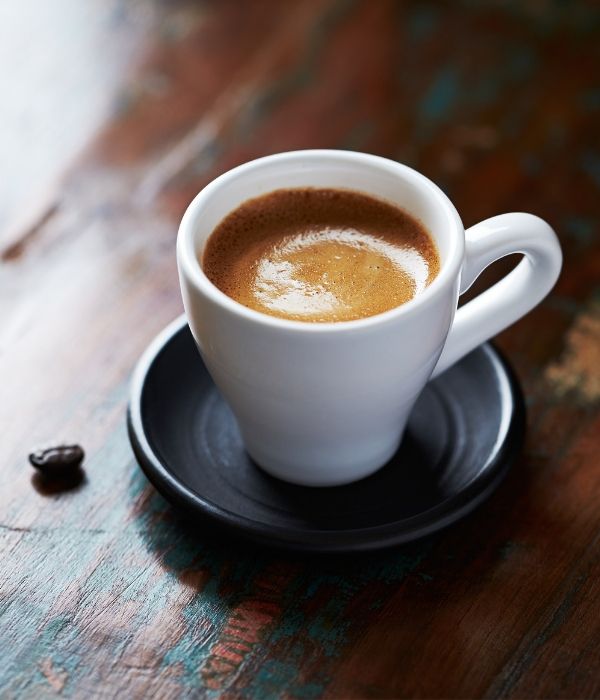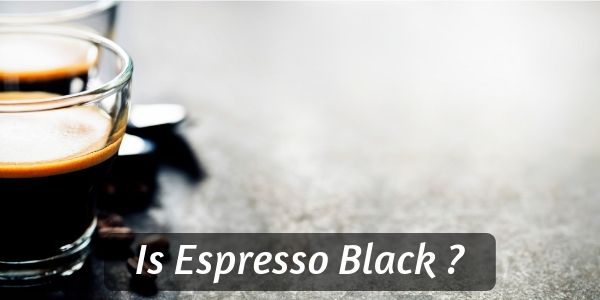You've heard it before. Black coffee, black espresso, pure espresso, and so on.
But is espresso black ? As in, black coffee ?
And for that matter, what is black coffee anyway ? Let me explain.
Table of Contents
So is espresso black coffee ?
Yes, espresso is a very strong black coffee. It's the strongest black coffee there is, as it's a concentrated form of coffee and there is no dairy or sugar added.
When brewed, espresso comes out as the darkest coffee brew possible, and also has a nice light brown crema (foam) on top. But it's a black coffee, since it contains no sugar, and no milk.
It's also one of the purest form of coffee there is. Nothing is held back, no sediments and no coffee oils either.
Espresso is a way of preparing coffee, and it happens to be black, in its unaltered form.
You will see espresso as the main ingredient in pretty much every coffee drink ever, like latte, cappuccino, mocha, flat white, and so on.
What is black coffee, then ?
Black coffee, to clear things up, is any coffee at all, that contains no sugar or milk. It sounds much more mysterious and dramatic as black coffee, I know.
But it's a name that stuck, and any barista or waiter anywhere will know what to bring if you order a black coffee.
Black coffee is also usually filter coffee, or just not espresso.
An espresso is by default black, and does not come with sugar or milk, unless asked for.
Any other coffee, like French press, Turkish, Moka, and so on, all come with those little milk creamers and a bit of sugar on the side.
Normally, you'd add them to your coffee and obtain a sort of cafe au lait (coffee with milk), though that usually has equal amount of milk and coffee.
So black coffee is the one coffee which will give you the exact taste and texture of your brewed coffee, exactly as it tastes, with nothing to influence it.
Some people swear by it, and it seems to be a favorite among many. I used to drink only black coffee up until my senior year in college. Then I did a full 180 and added all the sugar and milk possible.
Back to black coffee, if you're currently trying to cut back on sugar and creamer, I've made a 6 day guide to help you switch to black coffee (espresso or not), and actually enjoy it.
What's the difference between black coffee and espresso ?
In short, there is no real difference between espresso and black coffee.
Black coffee is a way of drinking coffee (no sugar or milk), and espresso in its pure form is black coffee.
Though when you say black coffee, people will usually take that to mean any other brewing method than espresso. Simply because espresso is so established that it's a whole other coffee.
So yes, espresso is black, and it's a form of black coffee.
Why espresso is usually taken black
Why take espresso black, though ? I mean, it's a strong enough drink to begin with.
Fairly bitter, strong in caffeine and taste, and a little on the thicker side. As in, espresso usually has more of a layered texture, with a definite mouthfeel.
You'll feel all the little bits of very, very fine coffee dust that forms when brewing.
And you'll also taste and feel the coffee oils, in the aerated crema on top of an espresso.
For some, this might be a drink that's too strong. For me, I know a black espresso isn't great unless there's nothing else available.
But for others, black espresso is the only way to drink coffee.
This is because it's the only kind of espresso that lets you taste the full, unadulterated flavor of their favorite coffee beans.
After all, where and how the coffee plant grows affects its overall taste.
There is no milk or sugar to interfere with the acidity, the crema, the fruity notes. If your coffee is good, you'll notice it when you drink it black.
And I agree with that, since it's really the cleanest way to enjoy the coffee.
However, we must take into account personal preferences. You palate may or may not be developed enough to fully taste the flavor profile of your coffee.
And in this case, you'll only know you like that coffee when you customize it to your preferences, and see how it behaves there.
How to enjoy a black espresso
If you'd like to get to understand and like the black espresso, then you're going to need to get used to a few things that are possibly going to be different from the way you might take coffee.
First, black espresso isn't about sweetness or ease of drinking it. Rather, it's more of an exercise in patience, and learning to distinguish a flavor from another.
Second, a good black espresso is going to be strong, and you'll need a glass of very cold water to go with it. You'll see why shortly.
Start by making your espresso as usual, and refrain from adding anything.
Make sure that your did not eat anything particularly flavorful, like bacon, garlic, something very sweet, smoked ham, and so on.
Your mouth should be free of any lingering flavors.
And your teeth should not be freshly brushed, since the toothpaste can and will leave a minty residue that will interfere with the espresso's taste.
Grab a glass of cold water, and settle down with your fresh espresso.

Try taking a sip of the crema, for starters. It won't be very sweet, but it should taste acceptable. It will probably taste bitter, and a bit sour. Still, it should be very creamy.
Then take your first sip of the espresso. You'll notice it's bitter, harsh, and maybe too strong on your tongue at first.
Taste it a bit before taking the next sip.
It will get some getting used to, but black espresso can be enjoyed. It does take a bit of practice, though.
Most will find it hard to get used to the lack of sweetness, and the harshness of a pure espresso.
Still, after a few sips where your skin may or may not get goosebumps, you'll start ti notice a few flavors. Maybe it's a tiny bit salty, and resembles something like a milky flavor.
Or it just tastes like it would go very well with milk. That's something I noticed in some espressos, and it's one of my favorite things.
At any point, if you drink a bit of that cold, cold water you'll notice it's sweet by contrast. It's also a tiny bit salty, since water does have some minerals.
Your palate will be clean again, since this is much like sniffing coffee beans when trying out perfumes.
Back to the espresso, you'll notice that when you take a sip again, the shock will be lessened. It'll be bitter, but not as much. Or, it won't bother you as much.
Keep taking small sips, and tasting them. Move the coffee over your tongues, and see how it feels. See if you can find any new flavor.
And if you've got two coffees, make sure you drink water between alternating sips, so you can better compare them.
What can influence the taste of a black espresso
Of course, if your espresso is poorly brewed, you'll notice it right away since now there's no milk or sugar to mask any imperfections.
So, here's a few thing that can and will ruin your espresso. More on how to brew a good one can be found here.
Bad water can ruin the taste of an espresso. If your water is overly hard, or it tastes funny to begin with, your coffee will taste bad as well. Usually leans on the sour, funky side.
I recommend you use purified water for your espresso, just to be sure you get no weird flavors.
A poorly maintained espresso machine will also result in weird tasting espresso. If it hasn't been rinsed with a special solution in a few months, it might build up unwanted flavors.
This is especially true of those espresso machines with a built-in grinder. Rancid ground coffee may build up in the grinder without your knowledge, and affect the taste of each espresso you brew.
Final thoughts
Drinking black espresso takes some patience and a willingness to discover new flavors. Once you do try it though, and keep at it for several days, you'll notice you'll start to like it.
It might never fully compare with espresso made into a cappuccino, but it might become your second favorite.
If you want to know more about coffee or tea, feel free to check the related articles below. Who knows what else you might find ?






